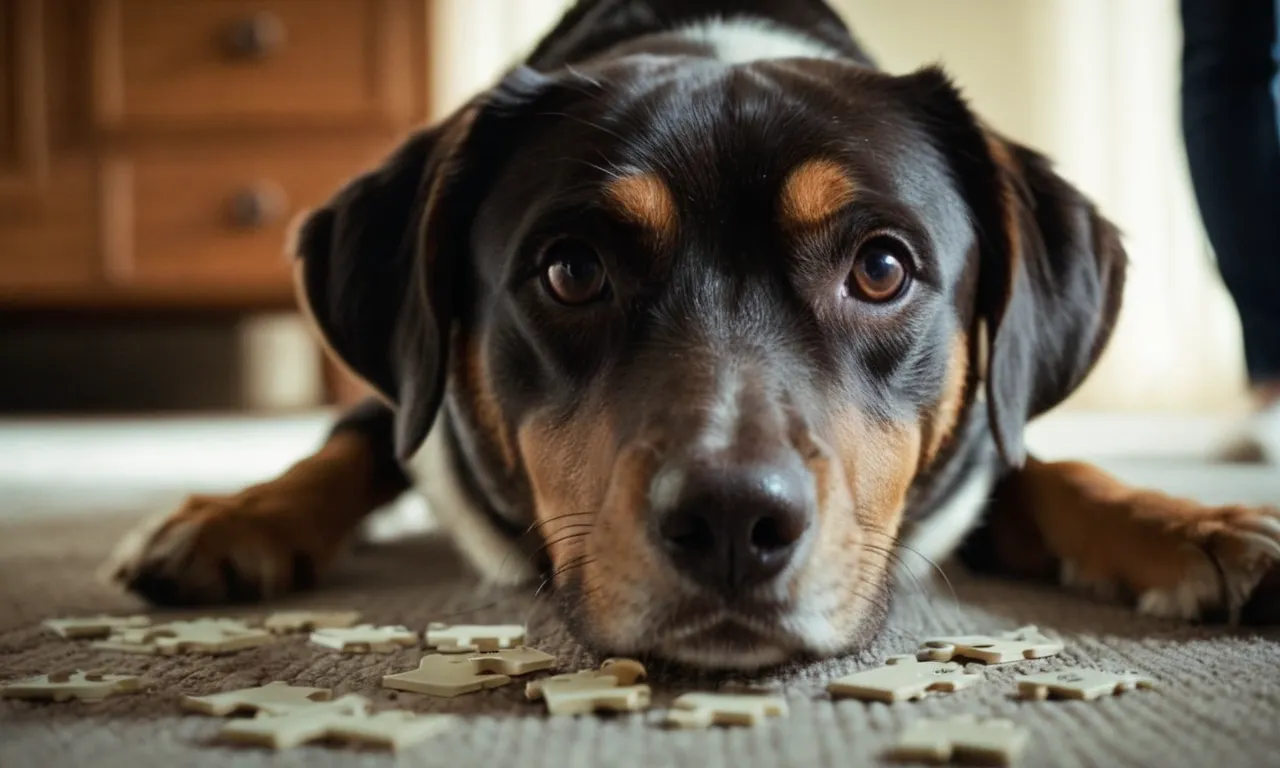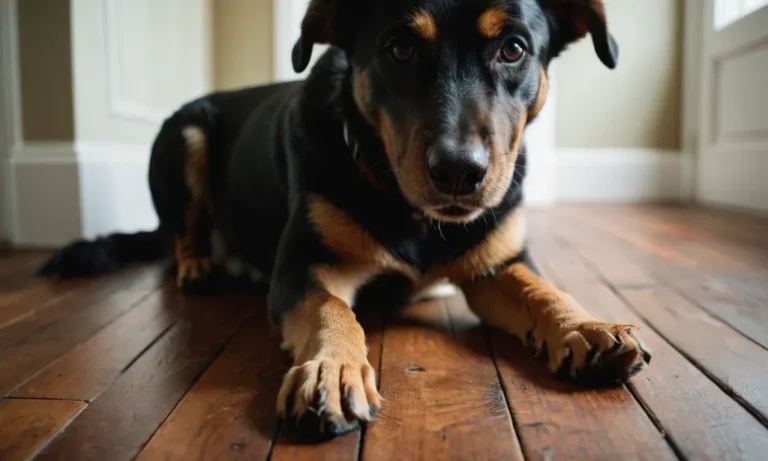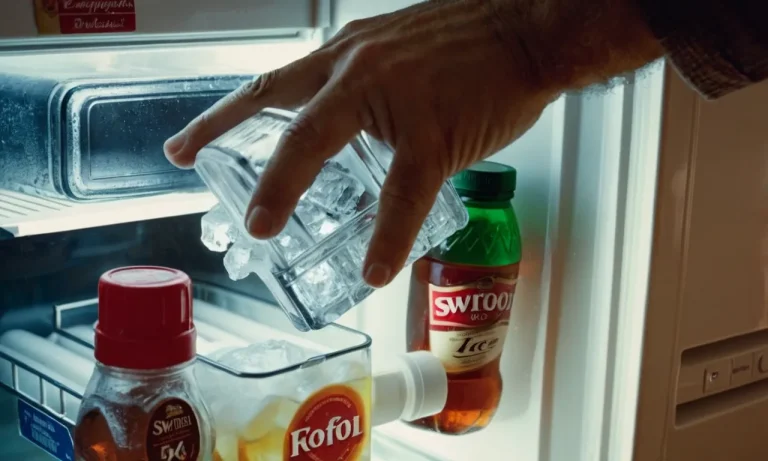Why Do Dogs Scoot Their Butts On The Floor?
If you’re a dog owner, you’ve likely witnessed the peculiar behavior of your furry friend scooting their butt along the floor. Though this butt-scooting motion may look funny and harmless, it could signal that your dog needs some medical attention.
If you’re short on time, here’s a quick answer to your question: Dogs scoot their butts on the floor because they are trying to relieve discomfort, irritation, or itchiness around their hindquarters or anal area.
Common causes include impacted anal glands, allergies, parasites, infections, and other medical issues.
In this comprehensive article, we’ll explore the top reasons why dogs drag their bottoms on the ground and what you can do about it. We’ll cover anal gland problems, allergies, worms, injuries, blockages, and other medical conditions that make dogs scoot.
We’ll also provide tips on how to stop the scooting behavior in dogs and when to take them to the vet.
Impacted Anal Glands
One of the main reasons why dogs scoot their butts on the floor is due to impacted anal glands. These glands are small, sac-like structures located on either side of a dog’s anus. They produce a smelly, oily substance that is typically released when a dog defecates or experiences stress or excitement.
This substance serves as a form of communication between dogs, as it contains unique scents that can convey information about their age, gender, and health status.
What are anal glands?
Anal glands, also known as anal sacs, are an essential part of a dog’s anatomy. They are present in many mammals, including dogs, cats, and even humans. These glands are located just inside the rectum, and their main function is to secrete a substance that helps with marking territory and identifying other animals.
The secretion is usually released naturally when a dog defecates, but sometimes, the glands can become impacted.
Signs of impacted anal glands
When a dog’s anal glands become impacted, it can cause discomfort and lead to unusual behavior, such as scooting their butts on the floor. Other signs of impacted anal glands may include licking or biting the anal area excessively, a foul odor emanating from the rear end, and visible swelling or redness around the anus.
Some dogs may also display signs of pain or discomfort when sitting or defecating.
Treatment for impacted anal glands
If you suspect that your dog’s anal glands are impacted, it is important to seek veterinary care. A veterinarian will perform a thorough examination and may manually express the glands to relieve the impaction.
In some cases, if the problem persists or recurs frequently, the veterinarian may recommend regular gland expression or even surgical removal of the glands. It’s crucial to address impacted anal glands promptly to prevent further complications and discomfort for your furry friend.
For more information about impacted anal glands and dog health, you can visit reputable websites such as akc.org or aspca.org.
Allergies
Allergies can cause a variety of uncomfortable symptoms in dogs, including itching and irritation. One common behavior that dogs may exhibit in response to allergies is scooting their butts on the floor.
This behavior is often a result of the itching and discomfort dogs experience due to allergic reactions.
Food allergies
Dogs can develop allergies to certain ingredients in their food, such as beef, chicken, wheat, or soy. When a dog consumes a food allergen, it can trigger an allergic reaction that leads to itching and irritation in various parts of their body, including their rear end.
In an attempt to relieve the discomfort, dogs may scoot their butts on the floor. If you suspect that your dog has a food allergy, it’s important to consult with your veterinarian to determine the best course of action.
Environmental allergies
In addition to food allergies, dogs can also develop allergies to environmental factors, such as pollen, dust mites, or certain grasses. These allergies can cause itching and irritation, leading dogs to scoot their butts on the floor.
It’s important to identify the specific allergens that are causing the allergic reaction in order to minimize your dog’s exposure. Your veterinarian may recommend allergy testing to pinpoint the exact triggers and develop a treatment plan.
Treating allergies in dogs
Treating allergies in dogs often involves a combination of strategies to relieve symptoms and manage the underlying cause. This may include dietary changes to eliminate potential food allergens, medications to reduce itching and inflammation, or immunotherapy to desensitize the dog’s immune system to specific allergens.
Your veterinarian will be able to guide you in developing a personalized treatment plan for your dog based on their specific allergies.
For more information on allergies in dogs, you can visit https://www.akc.org/dog-breeds/ or https://www.aspca.org/pet-care/dog-care/common-dog-allergies.
Worms and Parasites
One possible reason why dogs scoot their butts on the floor is due to worms and parasites. These pesky creatures can cause discomfort and irritation in a dog’s digestive system, leading them to engage in the butt scooting behavior.
There are several types of worms and parasites that can affect dogs, including roundworms, tapeworms, whipworms, and hookworms.
Roundworms
Roundworms are one of the most common types of worms that dogs can contract. They are usually passed through contaminated soil, feces, or infected animals. When dogs have roundworms, they may experience diarrhea, weight loss, and a potbellied appearance.
If left untreated, roundworms can cause serious health issues for dogs.
Tapeworms
Tapeworms are another type of worm that can affect dogs. They are typically transmitted through ingesting fleas or small animals that are infected with tapeworm eggs. Dogs with tapeworms may exhibit symptoms such as vomiting, weight loss, and a dry coat.
It is important to treat tapeworm infections promptly to prevent further complications.
Whipworms
Whipworms are parasites that live in the large intestine of dogs. They are often contracted through contact with contaminated soil or feces. Dogs with whipworms may experience symptoms such as bloody diarrhea, weight loss, and dehydration.
Treating whipworm infections can help alleviate the discomfort and prevent the spread of the parasite.
Hookworms
Hookworms are small worms that attach themselves to the lining of a dog’s intestines and feed on their blood. They are usually transmitted through contact with contaminated soil or through a mother dog’s milk. Dogs with hookworms may show symptoms such as pale gums, diarrhea, and weight loss.
Prompt treatment is necessary to prevent further health complications.
In addition to worms, other parasites such as fleas, ticks, and mites can also cause dogs to scoot their butts on the floor. Fleas are a common external parasite that can cause itching and discomfort. Ticks can transmit diseases and cause irritation to a dog’s skin.
Mites, such as ear mites, can cause intense itching and inflammation in a dog’s ear canal.
To prevent and treat worm and parasite infestations, it is important to regularly deworm your dog and use preventive measures such as flea and tick control. Consulting with a veterinarian is essential for proper diagnosis and treatment. Remember, a healthy and parasite-free dog is a happy dog!
Injuries, Obstructions and Other Issues
Dogs scooting their butts on the floor can be a sign of various underlying issues. Here are some possible reasons why your furry friend may be engaging in this behavior.
Anal sacculitis
One common cause of scooting is anal sacculitis. The anal sacs, located on either side of a dog’s anus, can become inflamed or infected, leading to discomfort. Scooting helps relieve the irritation, as the movement can help empty the sacs.
If your dog is scooting excessively or shows signs of discomfort, it’s important to consult a veterinarian for proper diagnosis and treatment.
Perianal fistula
Another potential cause of scooting is perianal fistula. These are painful, chronic sores that develop around the anus. Dogs suffering from perianal fistulas may scoot to alleviate the discomfort caused by the open sores.
Treatment typically involves a combination of medication, diet changes, and sometimes surgery.
Tumors or growths
In some cases, scooting can be a symptom of tumors or growths near the anus. These growths can cause discomfort and irritation, leading to the scooting behavior. It’s essential to have any unusual lumps or bumps examined by a veterinarian to rule out any serious health concerns.
Urinary tract infection
While scooting is primarily associated with issues in the anal area, it’s worth considering that a urinary tract infection (UTI) could also be the cause. UTIs can cause discomfort and irritation, leading to scooting as an attempt to alleviate the discomfort.
If your dog is exhibiting other symptoms such as frequent urination or blood in their urine, it’s crucial to seek veterinary attention.
Spinal injury or problem
In some cases, scooting may be related to a spinal injury or problem. Issues such as herniated discs or nerve damage can cause discomfort in the pelvic area, leading to scooting as a way to find relief.
If you suspect a spinal issue, it’s important to consult a veterinarian for proper diagnosis and treatment.
Foreign object stuck in anus
Scooting can also occur if a foreign object becomes lodged in the anus. Dogs are naturally curious and may explore their surroundings with their noses and mouths. In some cases, this can lead to objects getting stuck in the anal area, causing discomfort and prompting the scooting behavior.
If you suspect a foreign object is the cause, it’s crucial to seek immediate veterinary attention to prevent further complications.
Swollen or infected anal glands
Anal glands are small sacs located on either side of a dog’s anus. These glands produce a smelly substance that is typically released during bowel movements. However, if the glands become blocked, infected, or swollen, they can cause discomfort and irritation, leading to scooting.
Regular anal gland expression by a professional groomer or veterinarian can help prevent issues with the anal glands.
Nerve damage
In rare cases, scooting may be a result of nerve damage in the pelvic area. This can occur due to trauma, injury, or underlying medical conditions. Nerve damage can cause discomfort or loss of sensation, leading to scooting as a way to alleviate the discomfort.
If you suspect nerve damage, it’s crucial to consult a veterinarian for proper evaluation and treatment options.
Remember, scooting is not a normal behavior for dogs and should not be ignored. If your dog is scooting frequently or shows signs of discomfort, it’s important to consult a veterinarian for a proper diagnosis and appropriate treatment.
When to See the Vet for Butt Scooting
While it may be amusing to witness a dog scooting their butt on the floor, it can actually be a sign of an underlying issue. In some cases, it may simply be a result of an itch or discomfort caused by a dirty bottom, but there are instances when it’s necessary to seek veterinary attention.
1. Persistent Scooting
If your dog is scooting their butt on the floor frequently and persistently, it’s a good idea to consult with a veterinarian. This could be a sign of an anal gland problem. Dogs have anal glands that produce a scent that is unique to each individual, and they can become impacted or infected, leading to discomfort and the urge to scoot.
2. Visible Signs of Irritation or Infection
If you notice redness, swelling, or discharge around your dog’s bottom, it could indicate an infection or irritation. These symptoms may be accompanied by a foul odor as well. It’s important to have a veterinarian examine your dog to determine the cause and provide appropriate treatment.
3. Changes in Behavior or Appetite
If your dog is scooting their butt in addition to displaying other unusual behaviors or experiencing a loss of appetite, it could be a sign of a more serious underlying health issue. It’s crucial to have your dog evaluated by a veterinarian to rule out any potential medical conditions.
4. Recurring Scooting
If your dog’s butt scooting is a recurring issue, even after attempts to clean their bottom or address any potential anal gland problems, it’s essential to seek veterinary attention. Recurring scooting could indicate a chronic condition that requires medical intervention.
Remember, it’s always better to err on the side of caution when it comes to your dog’s health. If you’re unsure whether your dog’s butt scooting warrants a visit to the vet, it’s best to consult with a professional to ensure your furry friend receives the necessary care.
How to Stop Butt Scooting in Dogs
Butt scooting in dogs can be both a frustrating and embarrassing behavior. Fortunately, there are several steps you can take to help put an end to this behavior and keep your furry friend comfortable. Here are some effective strategies:
Express anal glands
One common reason dogs scoot their butts is because their anal glands are full and need to be expressed. These glands, located on either side of the anus, release a unique scent that helps dogs mark their territory. When they become impacted, dogs may scoot to relieve the discomfort.
If you suspect this is the issue, it’s best to have a veterinarian or a professional groomer express the glands for you. They can show you how to do it at home if necessary.
Treat underlying medical issue
Butt scooting can also be a symptom of an underlying medical issue such as worms, diarrhea, or allergies. If you notice your dog scooting excessively or if there are other signs of discomfort, it’s important to take them to the vet for a thorough examination.
The vet will be able to diagnose and treat any medical issues contributing to the behavior.
Add fiber to diet
In some cases, dogs may scoot because their stools are too soft or their anal glands are not being emptied properly. Adding fiber to their diet can help firm up their stools and promote regular bowel movements. You can try incorporating pumpkin, sweet potatoes, or fiber supplements into their meals.
However, it’s always best to consult with a veterinarian before making any major changes to your dog’s diet.
Clean the area
When a dog scoots their butt, it can leave behind fecal matter and bacteria on the floor or furniture. To prevent the spread of germs and keep your home clean, it’s important to clean the affected area thoroughly.
Use pet-friendly cleaning products and disinfectants to ensure a hygienic environment for both you and your furry friend.
Use dog diapers
If your dog’s butt scooting becomes a persistent issue, you may consider using dog diapers as a temporary solution. Dog diapers are designed to catch any fecal matter and prevent it from coming into contact with surfaces in your home.
They can be particularly useful during the training process or while you work with a veterinarian to address the underlying cause of the behavior.
Distract and redirect
When you catch your dog in the act of butt scooting, it’s important to redirect their attention to a more appropriate behavior. Offer them a treat or engage them in a game to divert their focus. By consistently redirecting their behavior, you can help break the habit of butt scooting over time.
Relieve itchiness
Itchiness around the anus can be a common cause of butt scooting in dogs. If your dog is consistently scooting and you suspect itchiness is the issue, consult with your veterinarian. They may recommend a medicated ointment or prescribe medication to alleviate the itching and discomfort.
Remember, each dog is unique, and the underlying cause of butt scooting may vary. It’s always best to consult with a veterinarian for an accurate diagnosis and tailored treatment plan for your furry friend.
With patience and the right approach, you can help your dog overcome this behavior and ensure their overall well-being.
Conclusion
In conclusion, dogs scoot their butts along the floor due to discomfort and irritation from conditions like impacted anal glands, allergies, parasites, infections, injuries, and other issues. While butt scooting may look harmless, it often indicates a medical problem that requires veterinary attention.
Don’t ignore frequent butt-scooting in your dog. Schedule a vet visit to identify and treat the underlying cause. You can also try home remedies like expressing anal glands, adding fiber to their diet, and gently cleaning the area.
With the right treatment, you can get to the bottom of the problem and stop the scooting for good!







